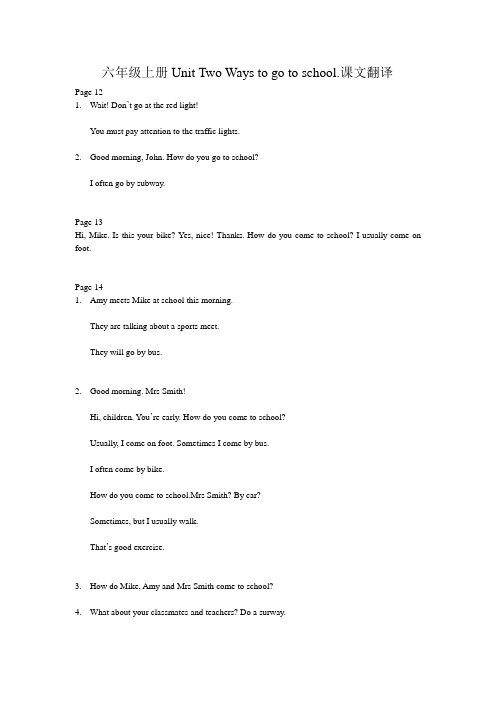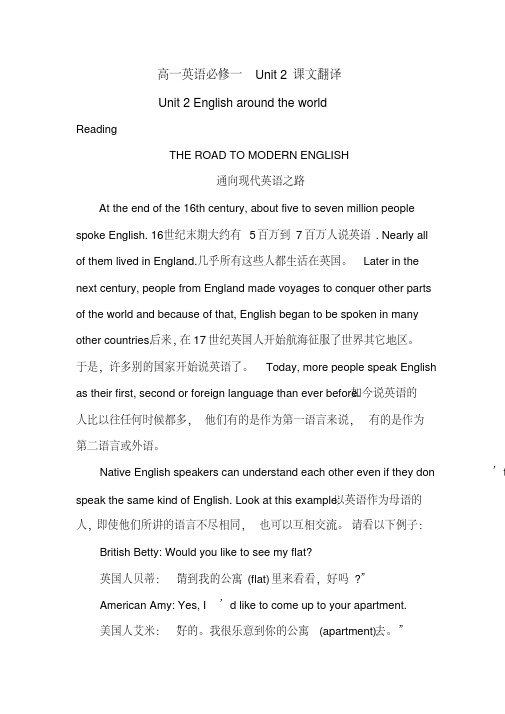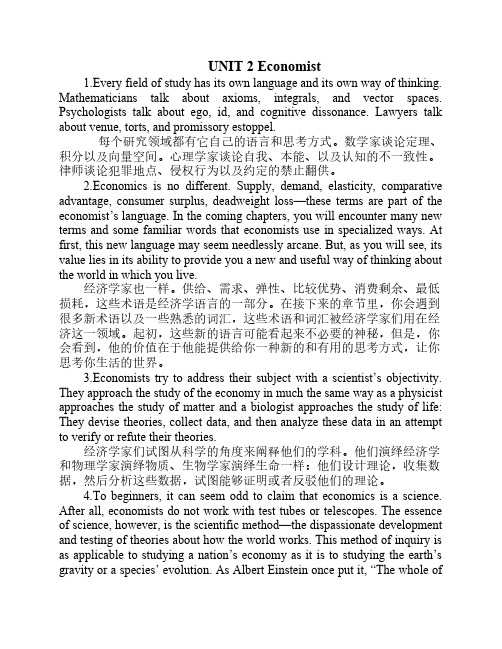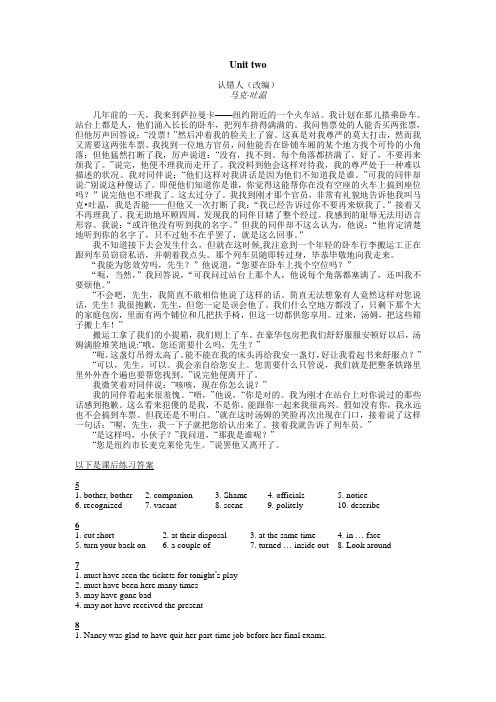UnitTwo翻译
2020新译林版新教材高中英语必修一unit2第二单元课文及翻译(附课本练习答案)

2020新译林版新教材⾼中英语必修⼀unit2第⼆单元课⽂及翻译(附课本练习答案)Book 1 Unit 2ReadingWhen teenagers’ bodies and minds go through a period of rapid development, every part of their lives can be influenced. The magazine article below is about teenagers’ relationships with their parents. Before you read the article, think about the following questions:What physical and mental changes do you experience as you become a teenager How do you deal with themWhat do you think “strangers under the same roof” meansStrangers under the same roof?Does every dinner with your parents seem to turn into a battle? Have your once warm and open conversations become cold and guarded? Do you feel that you just cannot see eye to eye with them on anything? You are not alone. Heated arguments and cold silences are common between teenagers and their parents.Teenagers’ physical changes may result in such family tensions. You may feel anxious that you are developing at a different rate to your friends, shooting up in height or getting left far behind. You might worry about your changing voice, weight problems or spots. When it all gets too much, your parents are often the first targets of your anger.It can be a big headache to balance your developing mental needs too. You enter a strange middle ground— 5 10 15 Reading 17 no longer a small child but not quite an adult. You have both a new desire for independence and a continued need for your parents’ love and support. You feel ready to be more responsible and make decisions on your own. Unfortunately, your parents do not always agree and that makes you feel unhappy. “Why can’t they just let me go?” you may wonder. On the other hand, when you are struggling to control your feelings, you wish they could be more caring and patient —sometimes they forget that growing up is a rough ride. It can be difficult when your parents treat you like a child but expect you to act like an adult. All of this can lead to a breakdown in your relationship.Although sometimes it may seem impossible to get along as a family, you can take action to improve the situation. The key to keeping the peace is regular and honest communication. When you disagree with your parents, take a minute to calm down and try to understand the situation from their point of view. Perhaps they have experienced something similar and do not want you to go through the same pain. After you have thought it through, explain your actions and feelings calmly, listencarefully, and address their concerns. Through this kind of healthy discussion, youwill learn when to back down and when to ask your parents to relax their control.Just remember that it is completely normal to struggle with the stress thatparent-child tensions create, and that you and your parents can work together to improve your relationship. The good news is that this stormy period will not last. Everything will turn out all right in the end, and the changes and challenges of your teenage years will prepare you for adulthood.Extended readingRead the short story about a mother’s love for her children.Mama and her bank accountEvery Saturday night Mama would sit down by the kitchen table and count out the money Papa had brought home.“For the rent.” Mama would count out the big silver pieces.“For the groceries.” Another group of coins.“I’ll need a notebook.” That would be my sister Christine, my brother Nels or me.Mama would put one or two coins to the side. We would watch with anxious interest. At last, Papa would ask, “Is that all?”And when Mama nodded, we could relax a little. Mama would look up and smile, “Good. We do not have to go to the Bank.”We were all so proud of Mama’s Bank Account. It gave us such a warm, secure feeling.When Nels graduated from grammar school, he wanted to go on to high school. “It will cost a little money,” he said.Eagerly we gathered around the table. I took down a box and laid it carefully in front of Mama. This was the “Little Bank”. It was used for sudden emergencies, such as the time when Christine broke her arm and had to be taken to a doctor.Nels listed the costs of the things he would need. Mama counted out the money in the Little Bank. There was not enough.“We do not want to go to the Bank,” she reminded. We all shook our heads.“I will work in Dillon’s grocery after school,” Nels volunteered.Mama gave him a bright smile and wrote down a number. “That’s not enough,” Papa said. Then he took his pipe out of his mouth and looked at it for a long time. “I will give up smoking,” he said suddenly.Mama reached across the table and touched Papa’s arm. Then she wrote down another figure.“I will look after the Elvington children every Friday night,” I said. “Christine can help me.”Now there was enough money. We all felt very good because we did not have to go downtown and draw money out of Mama’s Bank Account. So many things came out of the Little Bank that year: Christine’s dress for the school play, my little sister Dagmar’s operation ... Whatever happened, we always knew we still had the Bank to depend upon.That was twenty years ago.Last year I sold my first story. When the check came, I hurried over to Mama’s and put it in her lap. “For you,” I said, “to put in your Bank Account.”I noticed for the first time how old Mama and Papa looked. Papa seemed shorter, and Mama’s hair was silver now.“Tomorrow,” I told Mama, “you must take it to the Bank.”“You will go with me, Katrin?”“That won’t be necessary. Just hand it to the teller. He’ll pay it into your account.” Mama looked at me. “There is no account,”she said. “In all my life, I’ve never been inside a bank.”And when I didn’t—couldn’t—answer, Mama said seriously, “It is not good for little ones to be afraid—to not feel secure.”(Adapted from Kathryn Forbes’s Mama’s Bank Account, which has 17 short stories and describes the struggles and dreams of a family in San Francisco in the early 1900s)TranslationUnit 2Reading最熟悉的陌⽣⼈?每天的家庭晚餐幻化成激烈战⽃?热情开朗的谈话蜕变成冷淡警惕?⽆论什么事情都夏⾍语冰?其实⼤家都⼀样。
六年级英语上册课文翻译unit2练习

六年级上册Unit Two Ways to go to school.课文翻译Page 121.Wait! Don’t go at the red light!You must pay attention to the traffic lights.2.Good morning, John. How do you go to school?I often go by subway.Page 13Hi, Mike. Is this your bike? Yes, nice! Thanks. How do you come to school? I usually come on foot.Page 141.Amy meets Mike at school this morning.They are talking about a sports meet.They will go by bus.2.Good morning. Mrs Smith!Hi, children. You’re early. How do you come to school?Usually, I come on foot. Sometimes I come by bus.I often come by bike.How do you come to school.Mrs Smith? By car?Sometimes, but I usually walk.That’s good exercise.3.How do Mike, Amy and Mrs Smith come to school?4.What about your classmates and teachers? Do a surway.Page 151.Let’s go to the nature park. Hooray!How do we get there?By bus.( by bus, by plane, on foot, by taxi, by ship, by subway, by train)2.How do you get to the USA from China? By planePage 161.What does Mrs Smith tell the children to do?2.Mr Jones, how can I get to the Fuxing Hospital?Take the No.57 bus over there.Thanks. Wow! So many pictures of bikes!They’re from my cousin in the USA.What’s this?A helmet. In the USA people on bikes must wear one.I see. Oh, the bus is coming! Bye, Mr Jones.Hey, don’t go at the red light!Oh, right! Thanks. I must pay attention to the traffic lights!What do you learn about riding a bike from the dialogue?3.Tell your patner: what do these signs mean? Where can you see them?You must look right before you cross the road. You can see this on the road in Hong Kong.Don’t touch the door. You can see this in the subway.Page 171.Slow down and stop at a yellow light.Stop and wait at a red light.Go at a green light.2.Look! The park is over there! Let’s go!Please wait! It’s red now. we must stop and wait.Page 181.How many ways can you think of to go to school? Talk with your partner.2.Different ways to go to schoolSome children go to school on foot in Munich, Germany.In Alaska, USA, it snows a lot. Some kids go to school by sled. I t’s fast.Some children in Jiangxi, China, go to school by ferry every day.In Papa Wesray, Scotland, the children go to school by ferry too. But in xx, they went to school by plane because the ferry didn’t work.3.Grandpa, let me read this for you. Thanks, Robin.I don’t go to school. I learn at home.Page 191.How many ways to go to school can you find in the text? Underline them.Does everyone in the text go to school?2.Pay attention!On foot: you must stop at a red light. / don’t go at a red light.By sled: you must drive slowly. / don’t let the dogs run too fast.By ferry: you must wear a life jacket. / don’t run on the ferry.Page 201.How does Wu Yifan go to the park? He goes by…How does the girl’s father go to work? He goes by…How does Amy go home? She goes…What will the woman do? She will… and…Page 21.1.Amy: It’s so good to see you, Annie!Annie: You too, Amy. I missed you.2.Annie:Wow, Chinese food is so different from British food.Amy: yes. Can you use chopsticksAmy:No, I can’t.3.Amy: Let’s take a bus home. We must cross the road. In the UK you drive on the right side.4.Annie: I see. We must look right before crossing the road.Amy: No, first left and then right!5.Amy: Look, the bus is over there!Annie: Wow, it’s a double-decker! The same as in London.6.Annie:Where is the door? Amy, there is no door on the bus!Amy: Haha, you’re looking at the wrong side again.。
高一英语必修一Unit2课文翻译

高一英语必修一Unit 2课文翻译Unit 2 English around the worldReadingTHE ROAD TO MODERN ENGLISH通向现代英语之路At the end of the 16th century, about five to seven million peoplespoke English. 16世纪末期大约有5百万到7百万人说英语. Nearly allof them lived in England.几乎所有这些人都生活在英国。
Later in thenext century, people from England made voyages to conquer other partsof the world and because of that, English began to be spoken in manyother countries.后来,在17世纪英国人开始航海征服了世界其它地区。
于是,许多别的国家开始说英语了。
Today, more people speak Englishas their first, second or foreign language than ever before.如今说英语的人比以往任何时候都多,他们有的是作为第一语言来说,有的是作为第二语言或外语。
Native English speakers can understand each other even if they don’t speak the same kind of English. Look at this example:以英语作为母语的人,即使他们所讲的语言不尽相同,也可以互相交流。
请看以下例子:British Betty: Would you like to see my flat?英国人贝蒂:“请到我的公寓(flat)里来看看,好吗?”American Amy: Yes, I’d like to come up to your apartment.美国人艾米:“好的。
学术英语(社科)Unit2二单元原文及翻译

UNIT 2 Economist1.Every field of study has its own language and its own way of thinking. Mathematicians talk about axioms, integrals, and vector spaces. Psychologists talk about ego, id, and cognitive dissonance. Lawyers talk about venue, torts, and promissory estoppel.每个研究领域都有它自己的语言和思考方式。
数学家谈论定理、积分以及向量空间。
心理学家谈论自我、本能、以及认知的不一致性。
律师谈论犯罪地点、侵权行为以及约定的禁止翻供。
2.Economics is no different. Supply, demand, elasticity, comparative advantage, consumer surplus, deadweight loss—these terms are part of the economist’s language. In the coming chapters, you will encounter many new terms and some familiar words that economists use in specialized ways. At first, this new language may seem needlessly arcane. But, as you will see, its value lies in its ability to provide you a new and useful way of thinking about the world in which you live.经济学家也一样。
Unit two 21世纪大学实用英语综合教程第二册课文翻译及课后答案

Unit two认错人(改编)马克·吐温几年前的一天,我来到萨拉曼卡——纽约附近的一个火车站。
我计划在那儿搭乘卧车。
站台上都是人,他们涌入长长的卧车,把列车挤得满满的。
我问售票处的人能否买两张票,但他厉声回答说:“没票!”然后冲着我的脸关上了窗。
这真是对我尊严的莫大打击,然而我又需要这两张车票。
我找到一位地方官员,问他能否在卧铺车厢的某个地方找个可怜的小角落;但他猛然打断了我,厉声说道:“没有,找不到。
每个角落都挤满了。
好了,不要再来烦我了。
”说完,他便不理我而走开了。
我没料到他会这样对待我,我的尊严处于一种难以描述的状况。
我对同伴说:“他们这样对我讲话是因为他们不知道我是谁。
”可我的同伴却说:“别说这种傻话了。
即便他们知道你是谁,你觉得这能帮你在没有空座的火车上搞到座位吗?”说完他也不理我了。
这太过分了。
我找到刚才那个官员,非常有礼貌地告诉他我叫马克•吐温,我是否能——但他又一次打断了我:“我已经告诉过你不要再来烦我了。
”接着又不再理我了。
我无助地环顾四周,发现我的同伴目睹了整个经过。
我感到的耻辱无法用语言形容。
我说:“或许他没有听到我的名字。
”但我的同伴却不这么认为,他说:“他肯定清楚地听到你的名字了,只不过他不在乎罢了,就是这么回事。
”我不知道接下去会发生什么,但就在这时候,我注意到一个年轻的卧车行李搬运工正在跟列车员窃窃私语,并朝着我点头。
那个列车员随即转过身,毕恭毕敬地向我走来。
“我能为您效劳吗,先生?”他说道,“您要在卧车上找个空位吗?”“呃,当然,”我回答说,“可我问过站台上那个人,他说每个角落都塞满了,还叫我不要烦他。
”“不会吧,先生,我简直不敢相信他说了这样的话。
简直无法想象有人竟然这样对您说话,先生!我很抱歉,先生,但您一定是误会他了。
我们什么空地方都没了,只剩下那个大的家庭包房,里面有两个铺位和几把扶手椅,但这一切都供您享用。
过来,汤姆,把这些箱子搬上车!”搬运工拿了我们的小提箱,我们则上了车。
高级翻译教程课文Unit Two(1)翻译

At the simplest level, new eating habits provide vivid evidence: Thai food, a rarity in Britain even ten years ago, is available in many traditional pubs and bars as well as in 470 restaurants throughout the country and on the shelves of all the big supermarket chains. The "modern British cuisine" promoted by a regiment oftelevision chefs borrows freely from Tuscany, Japan, California and even Morocco.
Britain International
The British caricature themselves as a nation of insular xenophobes. This helps to disguise the fact that they are living in one of the world's most international countries. Saloon bar patriots may be happy to read tabloid newspapers which take every opportunity to hurl abuse at continental neighbouro employ Australian staff, who serve Thai food and Mexican beer to people who work for Korean companies, wear Italian clothes and- though they still can't manage a complete sentence in French are beginning to talk like Americans. The bar is also likely to be foreign- owned: a Japanese bank, Nomura, recently became the largest pub landlord in Britain.
实用科技英语翻译 UNIT TWO[10页]
![实用科技英语翻译 UNIT TWO[10页]](https://img.taocdn.com/s3/m/f197221ffd4ffe4733687e21af45b307e871f9ac.png)
6. 【原文】That reality has been seized upon by some groups and scientists disputing the overall consensus and opposing changes in energy policies.
——唐·贾公彦 把一种语言文字的意义用另一种语言文字表达出来(也指方言与民族共同语、方言与 方言、古代语与现代语之间一种用另一种表达):把代表语言文字的符号或数码用语 言文字表达出来。
——《现代汉语词典》 把已说出或写出的话的意思用另一种语言表达出来的活动。
——《中国大百科全书·语言文字卷》
翻译过程,可以简单地描述为这样的一个循环:
?译文虽然对这些气候问题的争论很激烈但与面对这些问题要做什么不做什么的争论相比这些问题变得相形见绌因为在我们生活的这个世界无论富裕的还是正在兴起的经济体仍然需要矿物燃料作支撑
实用科技英语翻译
UNIT TWO Global Warming
翻译及科技翻译对译者的要求
翻译定义:
Translating is the replacement of textual material in one language (SL) by equivalent textual material in another language (TL).
作为译者,即要娴于双语语言运用,还需要具备广博 的文化知识以及良好的专业知识。就科技翻译来说, 通常科技文章具有“语气正式,陈述客观准确,语言 规范,文体质朴,逻辑性强,专业术语性强”等特点。 这就需要译者具备: 1)高强的英汉语言能力; 2)熟悉英汉文化差异; 3)较好的专业知识背景; 4)熟悉英汉科技文化; 5)严肃认真的态度。
六年级英语上册课文翻译unit2练习

六年级上册Unit Two Ways to go to school.课文翻译Page 121.Wait! Don’t go at the red light!You must pay attention to the traffic lights.2.Good morning, John. How do you go to school?I often go by subway.Page 13Hi, Mike. Is this your bike? Yes, nice! Thanks. How do you come to school? I usually come on foot.Page 141.Amy meets Mike at school this morning.They are talking about a sports meet.They will go by bus.2.Good morning. Mrs Smith!Hi, children. You’re early. How do you come to school?Usually, I come on foot. Sometimes I come by bus.I often come by bike.How do you come to school.Mrs Smith? By car?Sometimes, but I usually walk.That’s good exercise.3.How do Mike, Amy and Mrs Smith come to school?4.What about your classmates and teachers? Do a surway.Page 151.Let’s go to the nature park. Hooray!How do we get there?By bus.( by bus, by plane, on foot, by taxi, by ship, by subway, by train) 2.How do you get to the USA from China? By planePage 161.What does Mrs Smith tell the children to do?2.Mr Jones, how can I get to the Fuxing Hospital?Take the No.57 bus over there.Thanks. Wow! So many pictures of bikes!They’re from my cousin in the USA.What’s this?A helmet. In the USA people on bikes must wear one.I see. Oh, the bus is coming! Bye, Mr Jones.Hey, don’t go at the red light!Oh, right! Thanks. I must pay attention to the traffic lights!What do you learn about riding a bike from the dialogue?3.Tell your patner: what do these signs mean? Where can you see them?You must look right before you cross the road. You can see this on the road in Hong Kong.Don’t touch the door. You can see this in the subway.Page 171.Slow down and stop at a yellow light.Stop and wait at a red light.Go at a green light.2.Look! The park is over there! Let’s go!Please wait! It’s red now. we must stop and wait.Page 181.How many ways can you think of to go to school? Talk with your partner.2.Different ways to go to schoolSome children go to school on foot in Munich, Germany.In Alaska, USA, it snows a lot. Some kids go to school by sled. I t’s fast.Some children in Jiangxi, China, go to school by ferry every day.In Papa Wesray, Scotland, the children go to school by ferry too. But in 2020, they went toschool by plane because the ferry didn’t work.3.Grandpa, let me read this for you. Thanks, Robin.I don’t go to school. I learn at home.Page 191.How many ways to go to school can you find in the text? Underline them.Does everyone in the text go to school?2.Pay attention!On foot: you must stop at a red light. / don’t go at a red light.By sled: you must drive slowly. / don’t let the dogs run too fast.By ferry: you must wear a life jacket. / don’t run on the ferry.Page 201.How does Wu Yifan go to the park? He goes by…How does the girl’s father go to work? He goes by…How does Amy go home? She goes…What will the woman do? She will… and…Page 21.1.Amy: It’s so good to see you, Annie!Annie: You too, Amy. I missed you.2.Annie:Wow, Chinese food is so different from British food.Amy: yes. Can you use chopsticksAmy:No, I can’t.3.Amy: Let’s take a bus home. We must cross the road. In the UK you drive onthe right side.4.Annie: I see. We must look right before crossing the road.Amy: No, first left and then right!5.Amy: Look, the bus is over there!Annie: Wow, it’s a double-decker! The same as in London.6.Annie:Where is the door? Amy, there is no door on the bus!Amy: Haha, you’re looking at the wrong side again.。
- 1、下载文档前请自行甄别文档内容的完整性,平台不提供额外的编辑、内容补充、找答案等附加服务。
- 2、"仅部分预览"的文档,不可在线预览部分如存在完整性等问题,可反馈申请退款(可完整预览的文档不适用该条件!)。
- 3、如文档侵犯您的权益,请联系客服反馈,我们会尽快为您处理(人工客服工作时间:9:00-18:30)。
Translation for Unit Two
1、让他父母失望的是他没有音乐天赋。
(let)
1. What let / lets his parents down was / is that he had / has no gift for music.
2、许多人把爱因斯坦看成是20世纪最伟大的天才之一。
(regard)
2. Many people regard Einstein as one of the 20th century’s greatest geniuses.
3、我走进妈妈的房间,手里拿着礼物。
(with)
3. I came into my mum’s room, with gifts / a gift in my hand.
4、随着生活水平的提高,中国人更加关心他们的身体状况。
( with )
4. With the rising of the living standard/ With the living standard rising,the Chinese are paying more attention to their health.
5、男孩子们想去野营,但被他们的父母拦住了。
(attempt n /v.)
5. The boys attempted to go/ made an attempt to go camping but were stopped by their parents.
6、毕业后他们主动到边远山区支教。
(offer)
6. They offered to teach in the remote mountainous areas after graduation.
7、几个月大的孩子对这个世界上的一切都充满了好奇心。
(curiosity)
7. Babies of several months old are full of curiosity about everything in the world.
8、他的方向感很好,从来没有迷路过。
(sense)
8. He has a good sense of direction and has never lost his way.
9、所有出席会议的老师同意了这个帮助处于困境中的同学的计划。
(agree)
9. All the teachers present agreed on / to the plan to help the students in trouble.
10、我希望一年到头都是春天。
( wish )
10. I wish it were spring all the year round.
11、记住这些定律和公式很容易,但要理解它们却不是那么容易的事。
(heart, rules and
formulas )
11. It’s easy to learn these rules and formulas by heart but not so easy to understand them.
12、我把他领到校长办公室。
( guide )
12. I guided him to the headmaster’s office.
13、他问我是否愿意加入他们的小组讨论。
( join )
13. He asked me if / whether I would like to join them in their group discussion.
14、很荣幸能遇见像你这样的天才。
( pleasure )
14. It’s a pleasure to meet a genius like you.
15、这位科学家70岁时因为发现了那个新元素而受到嘉奖。
(honour v.)
15. The scientist was honoured for his discovery of the new element when he was 70.
16、为了对这个科学家表示敬意,我们为他举行了80岁生日派对。
( honour n. )
16. In honour of the scientist, We held a party for his 80th birthday
17、他把银杯授予智力竞赛中的获胜者。
(present v. )
17. He presented the silver cup to the winner at the quiz show.
18、虽然这本书只值20元,但我觉得非常值得一读。
( worth )
18. Although the book is worth only 20 yuan, I think it is well worth reading.
19、在这样正规的场合,你不应该穿得这么随意。
(occasion)
19. You shouldn’t wear casual clothes on such a formal occasion.
20、我很想读一读《剧院魅影》的原著。
(original n.)
20. I would like to read The Phantom of the Opera in the original.。
